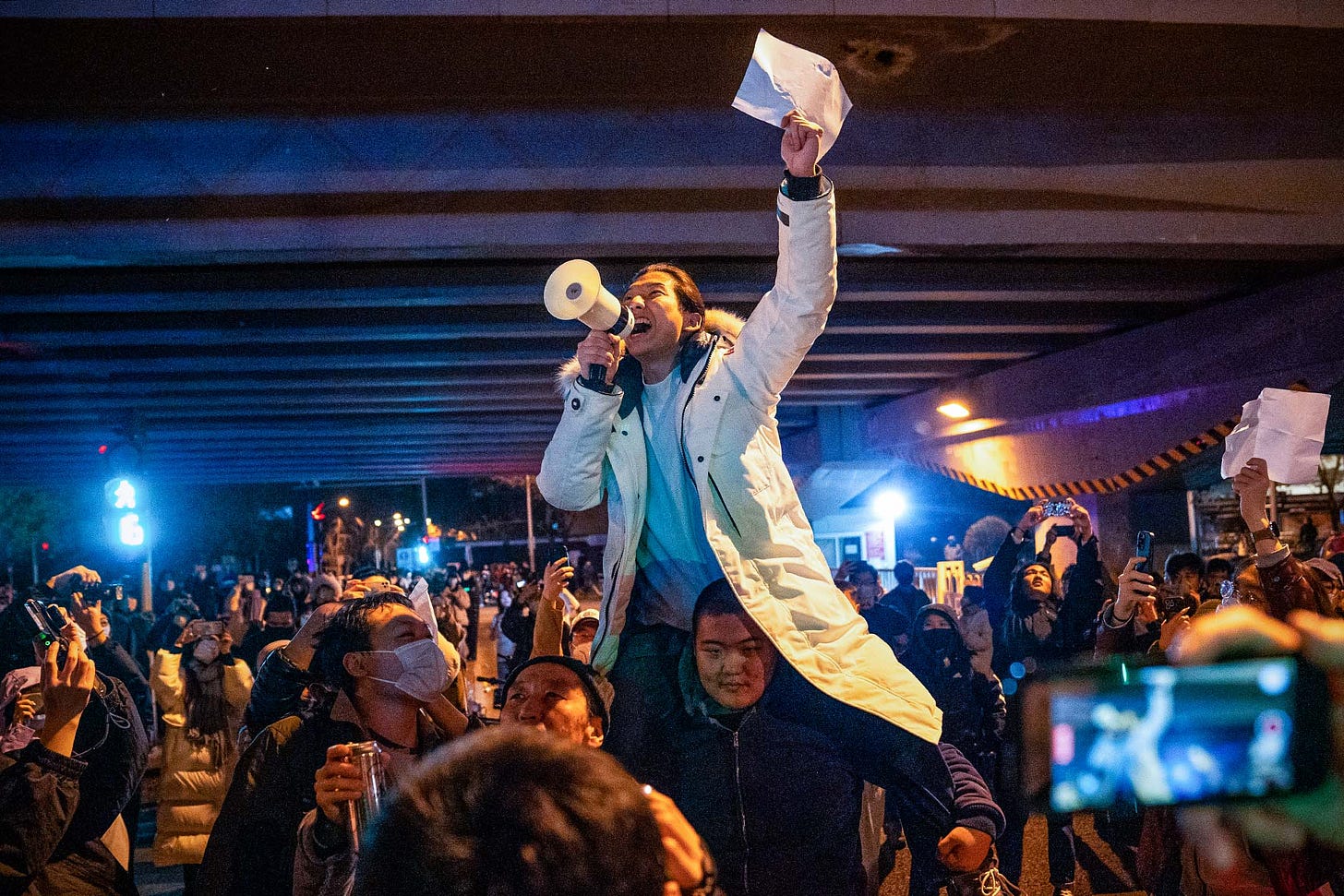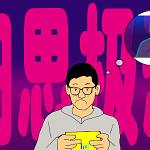Welcome to RealTime Mandarin—a multimedia resource to immerse you in the latest Chinese language trends, inspire you to practice and improve your Mandarin every week, and empower you to communicate with confidence.
Subscribe now to get the next issue straight to your inbox!
In Beijing last weekend, a protester held a banner which read:
他们会吃人,就未必不会吃我
They eat people.
So they won’t necessarily not eat me.
These are the words of 20th century Chinese novelist, Lǔ Xùn 鲁迅, from A Madman’s Diary (狂人日记 kuáng rén rì jì) published in 1918.
The short story was an attack on ‘cannibalism’ in Chinese society at that time, challenging conventional thinking and traditions.
Lu Xun's madman sees cannibalism (吃人 chī rén) everywhere: in his family, in his village, and in Confucian society as a whole.
In the following lines in the story, he goes on:
His words, toxic. His smiles, like knives. His teeth, sharp in rows. This is someone who eats people.
In ancient times they ate people. I remember, but not clearly. Flicking through the pages of history, I see there is no date in this history, and the words "benevolence, righteousness and morality" are scrawled across each page. I couldn't sleep. On reading into the night, I finally saw the words written between the lines filling the page: "eating people"!
我看出他话中全是毒,笑中全是刀。他们的牙齿,全是白厉厉的排着,这就是吃人的家伙。
古来时常吃人,我也还记得,可是不甚清楚。我翻开历史一查,这历史没有年代,歪歪斜斜的每页上都写着“仁义道德”几个字。我横竖睡不着,仔细看了半夜,才从字缝里看出字来,满本都写着两个字是“吃人”!
For protesters in Beijing, Lu Xun’s words express their frustration at the government’s zero-covid policies which are ‘eating people’.
Lu Xun’s words were elsewhere in protests too:
The words of Lu Xun were written at the base of the banner: ‘I hope Chinese youth can escape the cold!’ At the end: ‘At the very least this society needs to give its young people hope!’
最下面写著作家鲁迅的一段“愿中国青年都摆脱冷气”,最后还写到,“这个社会至少要让年轻人看到希望!”
Protesters didn’t just evoke Lu Xun.
Their language about young people and rising up drew from the words of Mao’s revolutionary writings in the 1930’s, a poem by CCP co-founder Chén Dúxiù 陈独秀 from the 1920’s, a speech by Xí Zhòngxūn 习仲勋 (Xi Jinping’s father) in 1959 about letting the people speak (应当允许人民讲话), China’s national anthem (起来!不愿做奴隶的人们!), a 19th century novelist who portrays the crumbling and corrupt Qing empire, the Book of Odes (诗经 shī jīng), a collection of poetry compiled from the 7th to 5th centuries BC, and even a computer game, League of Legends (英雄联盟 yīngxióng liánméng), released in China in 2009.
On social media, sarcastic posts mocked censors repearting characters ‘good good good’ (好好好), ‘bad bad bad’ (坏坏坏), and even ‘not good not bad’ (不好不坏).
Internet users found ways to make their point with English acronyms, avoiding machine-based censors:
JC = 警察 jǐng chá - police
大家都是合理表达诉求。反而是jc在用暴力 - The people are reasonably expressing their concerns. It’s the police who are being violent.
PUA = pick up artist = 被骗 bèi piàn - to be deceived
PUA自己你是高手 - You are a master at deceiving yourself [that everything’s ok]
CPU = central processing unit = 被洗脑 bèi xǐ nǎo - to be brainwashed
哈哈 被cpu得不轻 - Hahaha - you’ve been seriously brainwashed!
Animal emojis and memes are used creatively.
Testing positive for covid is replaced by a sheep emoji. The word for testing positive (阳) and sheep (羊) are both pronounced yáng:
🐑 = 阳 yáng - testing positive for covid
我小区内无🐑,至今除了做核酸已经闭门不出第五天了 - There are no positive cases in my district and I have still been locked down and unable to go out for the last five days covid.
An image of llamas on Urumqi Street in Shanghai sends the message: ‘f*ck you’. The word for llama in Chinese is ‘grass mud horse’ (草泥马 cǎo ní mǎ) which sounds similar to ‘f*ck your mother’.
And, there were also protests without any language at all.
Students in Nanjing and other cities silently held up blank sheets of white paper to draw attention to censorship.
Holding a sheet of white paper has a special political meaning in China. Because of the country’s harsh political environment, raising any ‘non-official’ placard with complaints or demands to government can be a crime. So raising a blank piece of paper can be regarded as a political statement of resistance against government.
举白纸在中国具有特殊的政治意涵,因中国严酷的政治气候,举起任何具“非官方”性质诉求的标语都有可能被罗织罪名。因而举起白纸通常被视为是一种对公权力表示反抗的政治表态
The idea of ‘blank’ paper (一空二百 yī kōng èr bǎi - ‘blank and poor’) was popular with Mao, who described the Chinese people as such in 1958, as Geremie R. Barmé writes in an excellent piece on how to read a blank piece of paper.
But here, we explore what people are saying to express their frustrations, anger and depression with life in China at the moment.
What idioms are they using?
What poets and writers are they quoting?
How are they coming out politically (政治出柜 zhèng zhì chū guì) on social media?
Favourite Five
1. 润 rùn
run
快点逃兄弟,要能润我也跑 - Quick, brother, escape. If I could run, I would.
Related: 应润尽润 yīng rùn jìn rùn - run if you can. We first discussed this a few weeks ago in 5 November newsletter.
2. 上火 shàng huǒ
get angry
最上火的是现在的防控 - Epidemic control is what gets people really angry.
3. 被和谐 bèi hé xié
to be pacified; removed, censored
全被和谐了,搜不到,不会上热搜的 - All the content has been removed. It doesn’t show up in online searches, or in the trending topics on Weibo.
4. 星星之火,可以燎原 xīng xīng zhī huǒ, kě yǐ liáo yuán
a small flame can start a raging fire
矛盾不是靠打压就能根除的,星星之火终会发展成燎原之势 - Social tensions cannot simply be squashed. A small flame could turn into a raging inferno.
More: a well-known phrase used by Mao in 1930 to describe China’s Red Army which we discuss in The China Project Phrase of the Week.
5. 拿着鸡毛当令箭 názhe jī máo dāng lìng jiàn
use a chicken feather as a warrant to issue an order; over-zealous implementation of laws and policies
铁皮生意,核酸生意什么时候整治? 鸡毛什么时候当不了令箭,一切就好起来了 - When will iron fencing and nucleic test companies be looked at? When will these community workers stop abusing their authority? That’s when things will start to improve.
Note: A great phrase used to describe how zero-covid policies are implemented at a local level - going way too far.
Consuming the Conversation
Useful words
Most of this week’s words are taken from comments on Weibo posts about epidemic control, where people find ways to express the frustrations despite the tight control and censorship.
铁拳 tiě quán
iron fist
只有铁拳落在自己的身上才会明白有多痛 - You only truly feel the pain when the iron fist has hit you personally.
醒悟 xǐng wù
awakening
反正我已经醒悟了,爱TM的国 - Anyway, I have awakened. How can I love this f*cking country?
捂嘴 wǔ zuǐ
cover your mouth; to silence
马上就给你压喽,嘴捂的严严实实的 - You’ll immediately be pressurised and silenced.
外网 wài wǎng
foreign internet; the free internet
墙内是一点消息都没有,只有外网才能看到真实的 - Inside the firewall there is no information. You can only find the truth on the web outside of the firewall.
靶子 bǎ zi
target
作为实质上的基本国策必然成为政治不满的靶子 - As the fundamental national policy, zero covid has become a target for people to express their dissatisfaction with the government.
Three-character phrases
无休止 wú xiū zhǐ
endlessly
人民生活的幸福度也就降低了,我们配合过了,努力过了,为什么无休止的增长,问题出现在哪 - People’s quality of life has gotten worse. We have cooperated and worked hard. But why does the virus keep spreading? Where is the problem?
带节奏 dài jié zòu
set the pace; misleading public opinion















